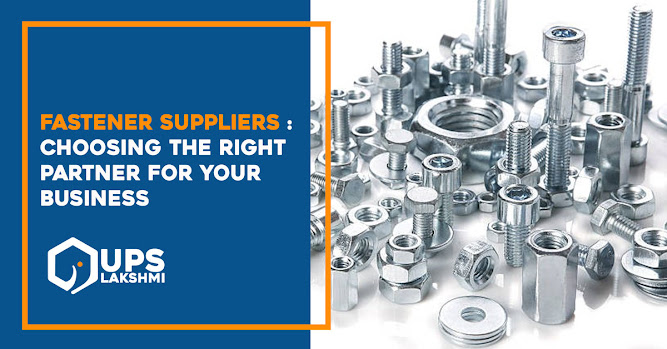Different Application Of Bolts
A bolt is a type of fastener that is used to connect two pieces. The bolts hold the parts together in a non-permanent manner, allowing them to be disassembled with the appropriate tool. Nuts are also used on bolts to improve the fastening process's efficacy.
A bolt is composed of three parts:
1. Head: The
upper piece of the bolt is known as the "head." The head form might
change. The purpose of the bolt determines the shape of the head.
2. Shank: The cylindrical section of the bolt is known
as the shank. The bolt's tail end is threaded to a suitable length to accept a
nut. Furthermore, the shank's end is trimmed to make inserting a hole and a nut
easier.
3. Threading: Threading can be found on all bolts. The
movement of a bolt into or out of a workpiece is referred to as threading.
However, most bolts lack full threading. They've got a smooth leg ahead of
them, then threading. Threading is present on all bolts.
The threading of a bolt interacts with the internal threading of the workpiece to connect them. External threading is found outside of the bolt's bottom most portion. This permits the external threading bolt to be pushed into and out of the internal threading of the workpiece.
Bolts are one of the most adaptable structural
fasteners, having a variety of configurations to fit a variety of materials and
strength needs.
Bolts are classed based on their distinct head forms,
strengths, finish, and materials.
Among them the most notable are:
Stud bolts:
Threaded rods, also known as stud bolts, are long rods that
are threaded on both ends; the thread may extend the length of the rod. They
are externally threaded fasteners without a head that are used in place of a
standard bolt and nut combination with two nuts on either side. Stud bolts are
widely used in flange connections.
Hex fit bolt:
Hex bolts are threaded bolts with a six-sided
hexagonal-shaped head. Hex bolts are available in two varieties: fully threaded
and partially threaded (with a clear shank along a portion of the body) and can
be utilized in a range of applications such as equipment and construction.
They are available in a number of types, sizes,
materials, and finishes, allowing you to select the best bolt for your task or
application.
Cylinder head bolts are fasteners that join the
cylinder heads of an engine to the engine block. They connect the engine block,
cylinder head gasket, and cylinder head.
The tightening tension of the bolt is crucial for the
mutual sealing of the combustion chamber, lubrication and coolant channels, and
ambient air. A job requiring perfect execution with cold or highly hot engines,
as well as negative and positive pressures.
When tightening (torquing) the cylinder-head bolts, the
bolt force generates the so-called surface pressure, which is required for a
faultless seal. When used in conjunction with the torquing method, bolts have a
considerable impact on surface pressure quality.
Shoulder bolts:
Shoulder bolts are screws composed of three sections:
the head, the unthreaded shoulder, and the threads. The screw shank has
integral threads on half or less of it, with the remaining shaft extended and
smooth to allow the bolted material to spin or move around the screw axis.
Shoulder screws, like all other screws, are intended to
hold items together and in place. These screws are designed for items that
require a mounting pin, joint, shaft, dowel, pivot, or sliding motion.
Banjo bolt:
A banjo bolt is one of the parts of a banjo fitting.
Banjo fittings are widely used to convey pressurized fluid. Although they are
most typically seen in motorcycle brake systems, this type of fluid-transfer
fitting has a wide range of non-motorcycling uses.
A banjo bolt is a hollow bolt with one side drilled.
This hole permits fluid to flow into the fitting's second hollow side.
Universal Precision Screws is a leading manufacturer of
top quality industrial and commercial fasteners with a track record parallel to
none in the region. Universal Precision Screws offers a wide range of products,
including bolts, dowel pins, fasteners, and more. The company's manufacturing
facilities are located in Rohtak, India.
UPS is committed to providing high quality products at
competitive prices. The company takes great pride in its ability to deliver
products within tight timeframes without sacrificing quality or service levels.




Comments
Post a Comment